Personal & Professional Development Plan Report - K/601/1572
VerifiedAdded on 2023/01/18
|14
|4314
|69
Report
AI Summary
This report presents a detailed personal and professional development plan, focusing on the application of values and principles within a health and social care setting. It explores the significance of personal values such as trust, honesty, and empathy, alongside the principles of support and ethical conduct. The report analyzes the impact of national culture, referencing Hofstede and Trompenaars' theories, and how cultural understanding influences interactions with service users. It further examines the influence of new developments, including legislation such as the Carers Act and the Sex Discrimination Act, medical advances, and technological advancements on the role of a senior care assistant. The report also includes a reflection on learning styles, SWOT analysis, and the importance of communication and collaboration in providing high-quality care. The student reflects on their learning and experiences in a care home setting, highlighting how cultural experiences and values impact their ability to deliver effective and compassionate care, and how they can apply the knowledge gained to improve their professional practice.
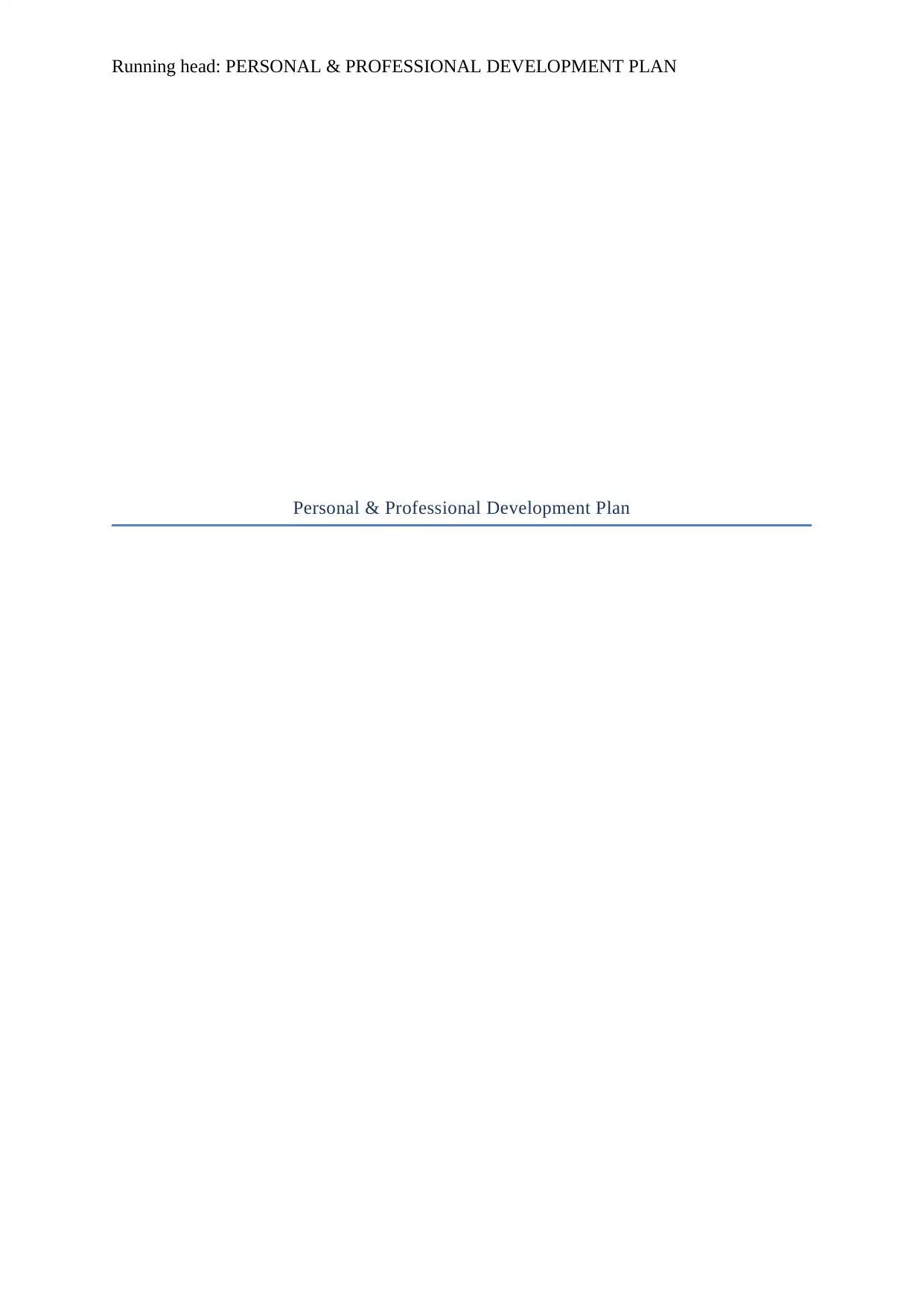
Running head: PERSONAL & PROFESSIONAL DEVELOPMENT PLAN
Personal & Professional Development Plan
Personal & Professional Development Plan
Paraphrase This Document
Need a fresh take? Get an instant paraphrase of this document with our AI Paraphraser
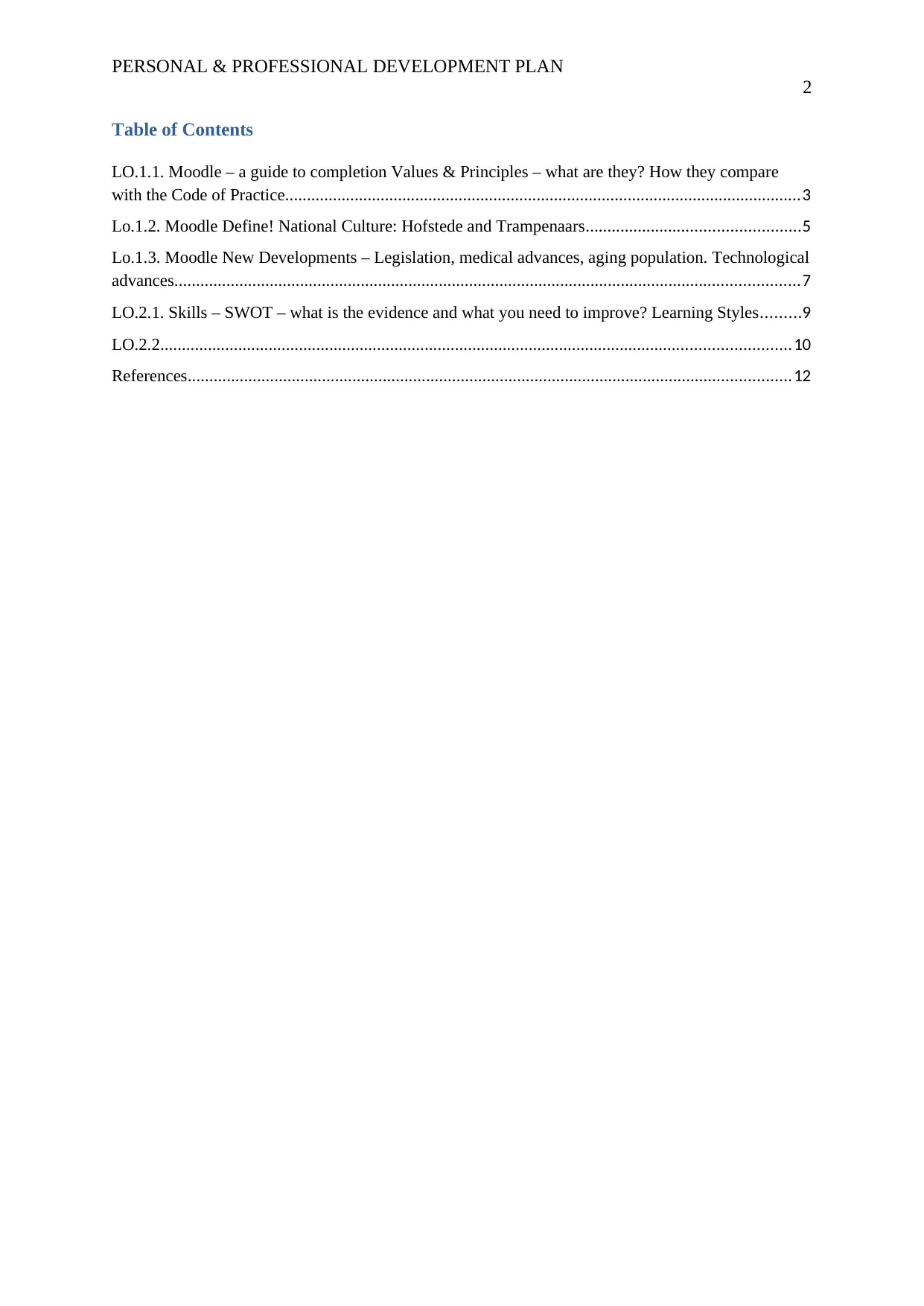
PERSONAL & PROFESSIONAL DEVELOPMENT PLAN
2
Table of Contents
LO.1.1. Moodle – a guide to completion Values & Principles – what are they? How they compare
with the Code of Practice.......................................................................................................................3
Lo.1.2. Moodle Define! National Culture: Hofstede and Trampenaars.................................................5
Lo.1.3. Moodle New Developments – Legislation, medical advances, aging population. Technological
advances................................................................................................................................................7
LO.2.1. Skills – SWOT – what is the evidence and what you need to improve? Learning Styles.........9
LO.2.2.................................................................................................................................................10
References...........................................................................................................................................12
2
Table of Contents
LO.1.1. Moodle – a guide to completion Values & Principles – what are they? How they compare
with the Code of Practice.......................................................................................................................3
Lo.1.2. Moodle Define! National Culture: Hofstede and Trampenaars.................................................5
Lo.1.3. Moodle New Developments – Legislation, medical advances, aging population. Technological
advances................................................................................................................................................7
LO.2.1. Skills – SWOT – what is the evidence and what you need to improve? Learning Styles.........9
LO.2.2.................................................................................................................................................10
References...........................................................................................................................................12
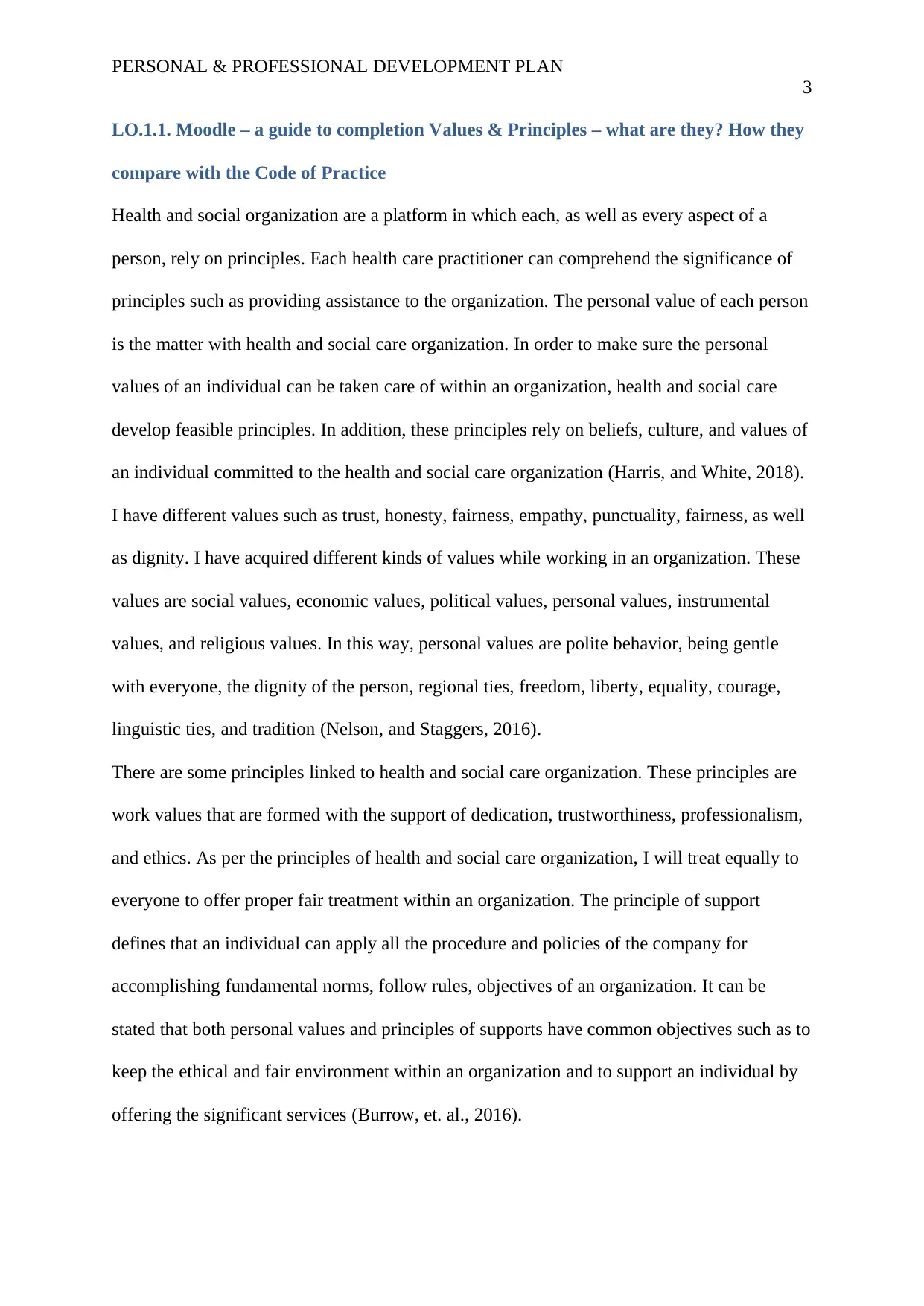
PERSONAL & PROFESSIONAL DEVELOPMENT PLAN
3
LO.1.1. Moodle – a guide to completion Values & Principles – what are they? How they
compare with the Code of Practice
Health and social organization are a platform in which each, as well as every aspect of a
person, rely on principles. Each health care practitioner can comprehend the significance of
principles such as providing assistance to the organization. The personal value of each person
is the matter with health and social care organization. In order to make sure the personal
values of an individual can be taken care of within an organization, health and social care
develop feasible principles. In addition, these principles rely on beliefs, culture, and values of
an individual committed to the health and social care organization (Harris, and White, 2018).
I have different values such as trust, honesty, fairness, empathy, punctuality, fairness, as well
as dignity. I have acquired different kinds of values while working in an organization. These
values are social values, economic values, political values, personal values, instrumental
values, and religious values. In this way, personal values are polite behavior, being gentle
with everyone, the dignity of the person, regional ties, freedom, liberty, equality, courage,
linguistic ties, and tradition (Nelson, and Staggers, 2016).
There are some principles linked to health and social care organization. These principles are
work values that are formed with the support of dedication, trustworthiness, professionalism,
and ethics. As per the principles of health and social care organization, I will treat equally to
everyone to offer proper fair treatment within an organization. The principle of support
defines that an individual can apply all the procedure and policies of the company for
accomplishing fundamental norms, follow rules, objectives of an organization. It can be
stated that both personal values and principles of supports have common objectives such as to
keep the ethical and fair environment within an organization and to support an individual by
offering the significant services (Burrow, et. al., 2016).
3
LO.1.1. Moodle – a guide to completion Values & Principles – what are they? How they
compare with the Code of Practice
Health and social organization are a platform in which each, as well as every aspect of a
person, rely on principles. Each health care practitioner can comprehend the significance of
principles such as providing assistance to the organization. The personal value of each person
is the matter with health and social care organization. In order to make sure the personal
values of an individual can be taken care of within an organization, health and social care
develop feasible principles. In addition, these principles rely on beliefs, culture, and values of
an individual committed to the health and social care organization (Harris, and White, 2018).
I have different values such as trust, honesty, fairness, empathy, punctuality, fairness, as well
as dignity. I have acquired different kinds of values while working in an organization. These
values are social values, economic values, political values, personal values, instrumental
values, and religious values. In this way, personal values are polite behavior, being gentle
with everyone, the dignity of the person, regional ties, freedom, liberty, equality, courage,
linguistic ties, and tradition (Nelson, and Staggers, 2016).
There are some principles linked to health and social care organization. These principles are
work values that are formed with the support of dedication, trustworthiness, professionalism,
and ethics. As per the principles of health and social care organization, I will treat equally to
everyone to offer proper fair treatment within an organization. The principle of support
defines that an individual can apply all the procedure and policies of the company for
accomplishing fundamental norms, follow rules, objectives of an organization. It can be
stated that both personal values and principles of supports have common objectives such as to
keep the ethical and fair environment within an organization and to support an individual by
offering the significant services (Burrow, et. al., 2016).
⊘ This is a preview!⊘
Do you want full access?
Subscribe today to unlock all pages.

Trusted by 1+ million students worldwide
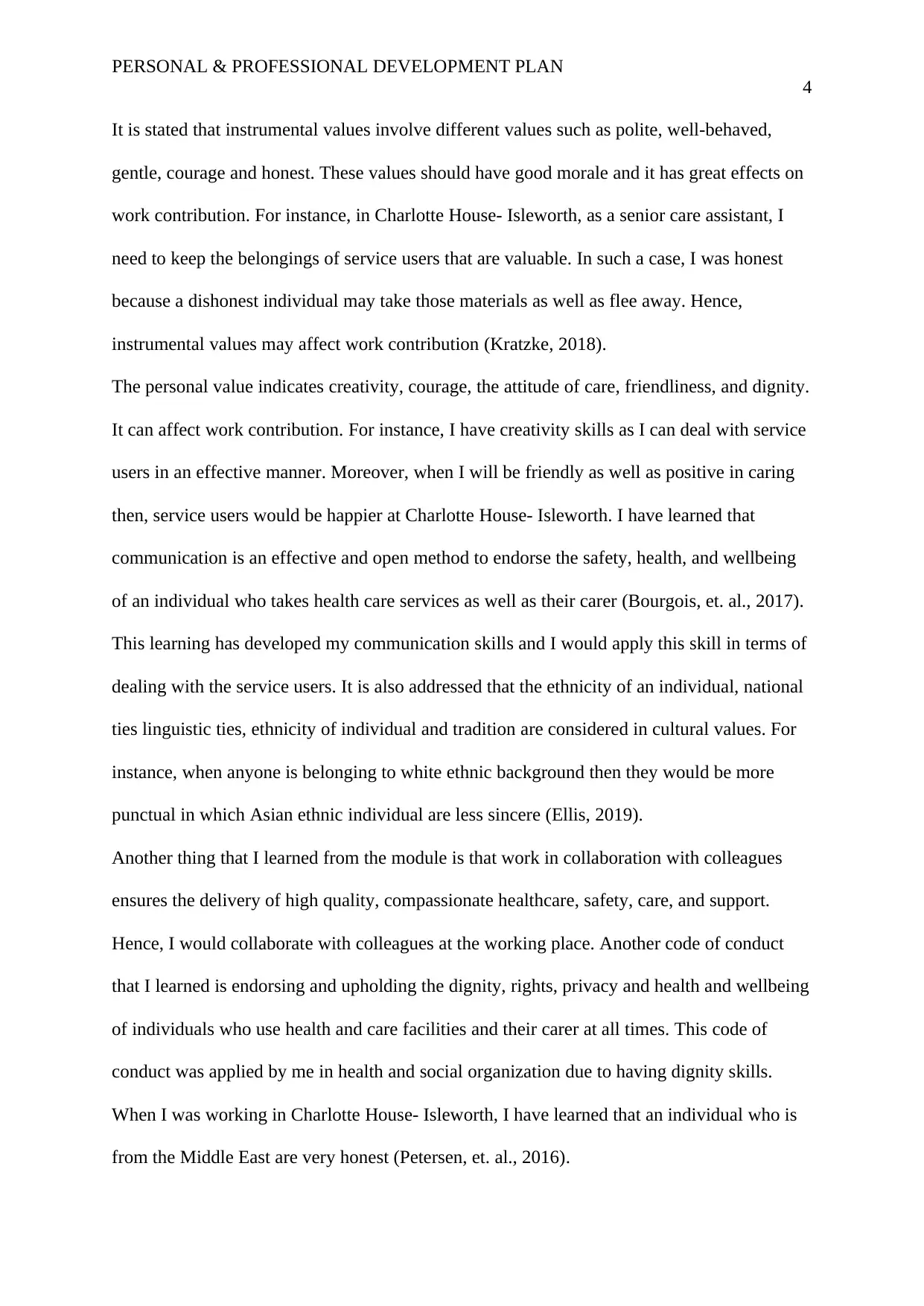
PERSONAL & PROFESSIONAL DEVELOPMENT PLAN
4
It is stated that instrumental values involve different values such as polite, well-behaved,
gentle, courage and honest. These values should have good morale and it has great effects on
work contribution. For instance, in Charlotte House- Isleworth, as a senior care assistant, I
need to keep the belongings of service users that are valuable. In such a case, I was honest
because a dishonest individual may take those materials as well as flee away. Hence,
instrumental values may affect work contribution (Kratzke, 2018).
The personal value indicates creativity, courage, the attitude of care, friendliness, and dignity.
It can affect work contribution. For instance, I have creativity skills as I can deal with service
users in an effective manner. Moreover, when I will be friendly as well as positive in caring
then, service users would be happier at Charlotte House- Isleworth. I have learned that
communication is an effective and open method to endorse the safety, health, and wellbeing
of an individual who takes health care services as well as their carer (Bourgois, et. al., 2017).
This learning has developed my communication skills and I would apply this skill in terms of
dealing with the service users. It is also addressed that the ethnicity of an individual, national
ties linguistic ties, ethnicity of individual and tradition are considered in cultural values. For
instance, when anyone is belonging to white ethnic background then they would be more
punctual in which Asian ethnic individual are less sincere (Ellis, 2019).
Another thing that I learned from the module is that work in collaboration with colleagues
ensures the delivery of high quality, compassionate healthcare, safety, care, and support.
Hence, I would collaborate with colleagues at the working place. Another code of conduct
that I learned is endorsing and upholding the dignity, rights, privacy and health and wellbeing
of individuals who use health and care facilities and their carer at all times. This code of
conduct was applied by me in health and social organization due to having dignity skills.
When I was working in Charlotte House- Isleworth, I have learned that an individual who is
from the Middle East are very honest (Petersen, et. al., 2016).
4
It is stated that instrumental values involve different values such as polite, well-behaved,
gentle, courage and honest. These values should have good morale and it has great effects on
work contribution. For instance, in Charlotte House- Isleworth, as a senior care assistant, I
need to keep the belongings of service users that are valuable. In such a case, I was honest
because a dishonest individual may take those materials as well as flee away. Hence,
instrumental values may affect work contribution (Kratzke, 2018).
The personal value indicates creativity, courage, the attitude of care, friendliness, and dignity.
It can affect work contribution. For instance, I have creativity skills as I can deal with service
users in an effective manner. Moreover, when I will be friendly as well as positive in caring
then, service users would be happier at Charlotte House- Isleworth. I have learned that
communication is an effective and open method to endorse the safety, health, and wellbeing
of an individual who takes health care services as well as their carer (Bourgois, et. al., 2017).
This learning has developed my communication skills and I would apply this skill in terms of
dealing with the service users. It is also addressed that the ethnicity of an individual, national
ties linguistic ties, ethnicity of individual and tradition are considered in cultural values. For
instance, when anyone is belonging to white ethnic background then they would be more
punctual in which Asian ethnic individual are less sincere (Ellis, 2019).
Another thing that I learned from the module is that work in collaboration with colleagues
ensures the delivery of high quality, compassionate healthcare, safety, care, and support.
Hence, I would collaborate with colleagues at the working place. Another code of conduct
that I learned is endorsing and upholding the dignity, rights, privacy and health and wellbeing
of individuals who use health and care facilities and their carer at all times. This code of
conduct was applied by me in health and social organization due to having dignity skills.
When I was working in Charlotte House- Isleworth, I have learned that an individual who is
from the Middle East are very honest (Petersen, et. al., 2016).
Paraphrase This Document
Need a fresh take? Get an instant paraphrase of this document with our AI Paraphraser
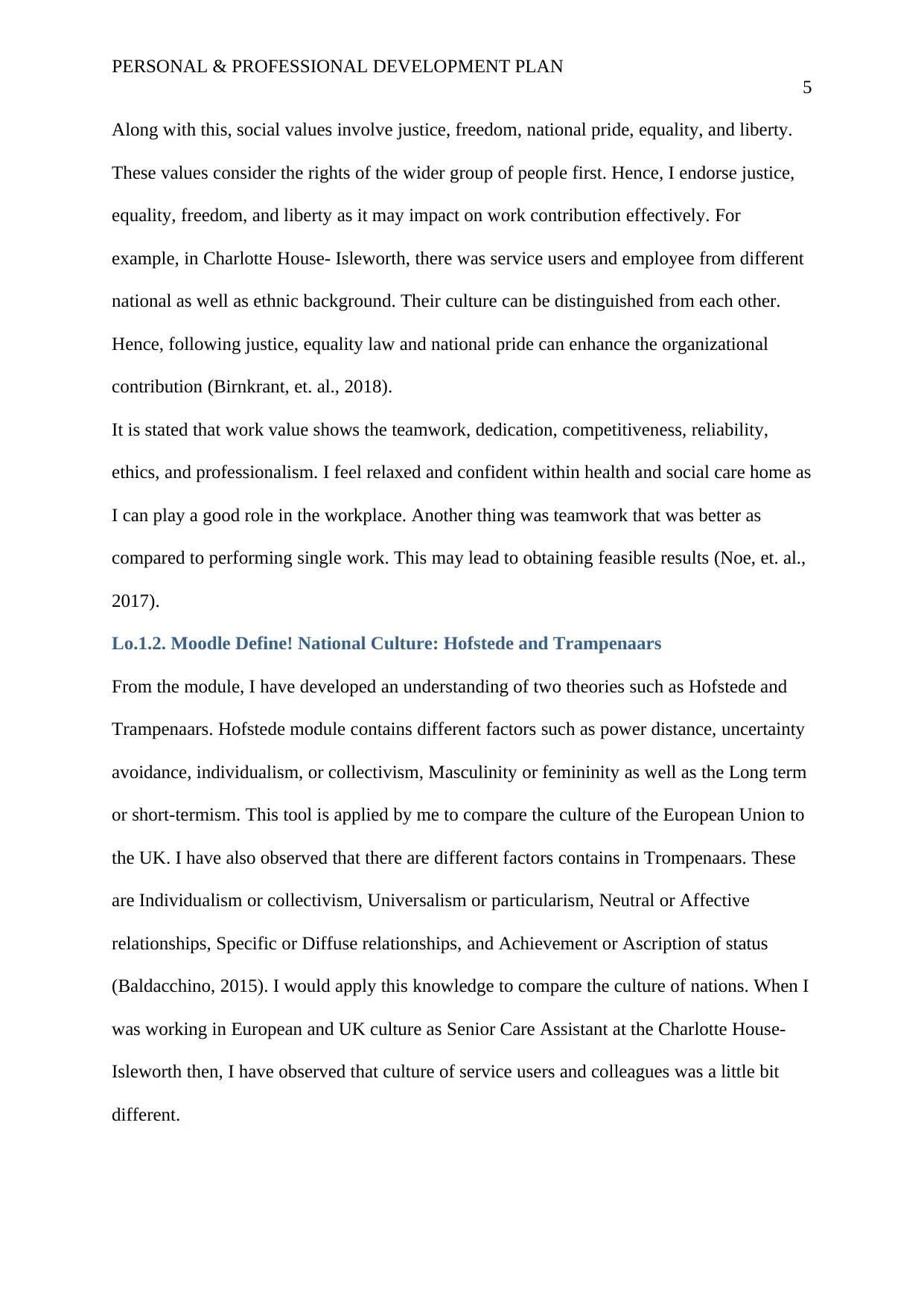
PERSONAL & PROFESSIONAL DEVELOPMENT PLAN
5
Along with this, social values involve justice, freedom, national pride, equality, and liberty.
These values consider the rights of the wider group of people first. Hence, I endorse justice,
equality, freedom, and liberty as it may impact on work contribution effectively. For
example, in Charlotte House- Isleworth, there was service users and employee from different
national as well as ethnic background. Their culture can be distinguished from each other.
Hence, following justice, equality law and national pride can enhance the organizational
contribution (Birnkrant, et. al., 2018).
It is stated that work value shows the teamwork, dedication, competitiveness, reliability,
ethics, and professionalism. I feel relaxed and confident within health and social care home as
I can play a good role in the workplace. Another thing was teamwork that was better as
compared to performing single work. This may lead to obtaining feasible results (Noe, et. al.,
2017).
Lo.1.2. Moodle Define! National Culture: Hofstede and Trampenaars
From the module, I have developed an understanding of two theories such as Hofstede and
Trampenaars. Hofstede module contains different factors such as power distance, uncertainty
avoidance, individualism, or collectivism, Masculinity or femininity as well as the Long term
or short-termism. This tool is applied by me to compare the culture of the European Union to
the UK. I have also observed that there are different factors contains in Trompenaars. These
are Individualism or collectivism, Universalism or particularism, Neutral or Affective
relationships, Specific or Diffuse relationships, and Achievement or Ascription of status
(Baldacchino, 2015). I would apply this knowledge to compare the culture of nations. When I
was working in European and UK culture as Senior Care Assistant at the Charlotte House-
Isleworth then, I have observed that culture of service users and colleagues was a little bit
different.
5
Along with this, social values involve justice, freedom, national pride, equality, and liberty.
These values consider the rights of the wider group of people first. Hence, I endorse justice,
equality, freedom, and liberty as it may impact on work contribution effectively. For
example, in Charlotte House- Isleworth, there was service users and employee from different
national as well as ethnic background. Their culture can be distinguished from each other.
Hence, following justice, equality law and national pride can enhance the organizational
contribution (Birnkrant, et. al., 2018).
It is stated that work value shows the teamwork, dedication, competitiveness, reliability,
ethics, and professionalism. I feel relaxed and confident within health and social care home as
I can play a good role in the workplace. Another thing was teamwork that was better as
compared to performing single work. This may lead to obtaining feasible results (Noe, et. al.,
2017).
Lo.1.2. Moodle Define! National Culture: Hofstede and Trampenaars
From the module, I have developed an understanding of two theories such as Hofstede and
Trampenaars. Hofstede module contains different factors such as power distance, uncertainty
avoidance, individualism, or collectivism, Masculinity or femininity as well as the Long term
or short-termism. This tool is applied by me to compare the culture of the European Union to
the UK. I have also observed that there are different factors contains in Trompenaars. These
are Individualism or collectivism, Universalism or particularism, Neutral or Affective
relationships, Specific or Diffuse relationships, and Achievement or Ascription of status
(Baldacchino, 2015). I would apply this knowledge to compare the culture of nations. When I
was working in European and UK culture as Senior Care Assistant at the Charlotte House-
Isleworth then, I have observed that culture of service users and colleagues was a little bit
different.
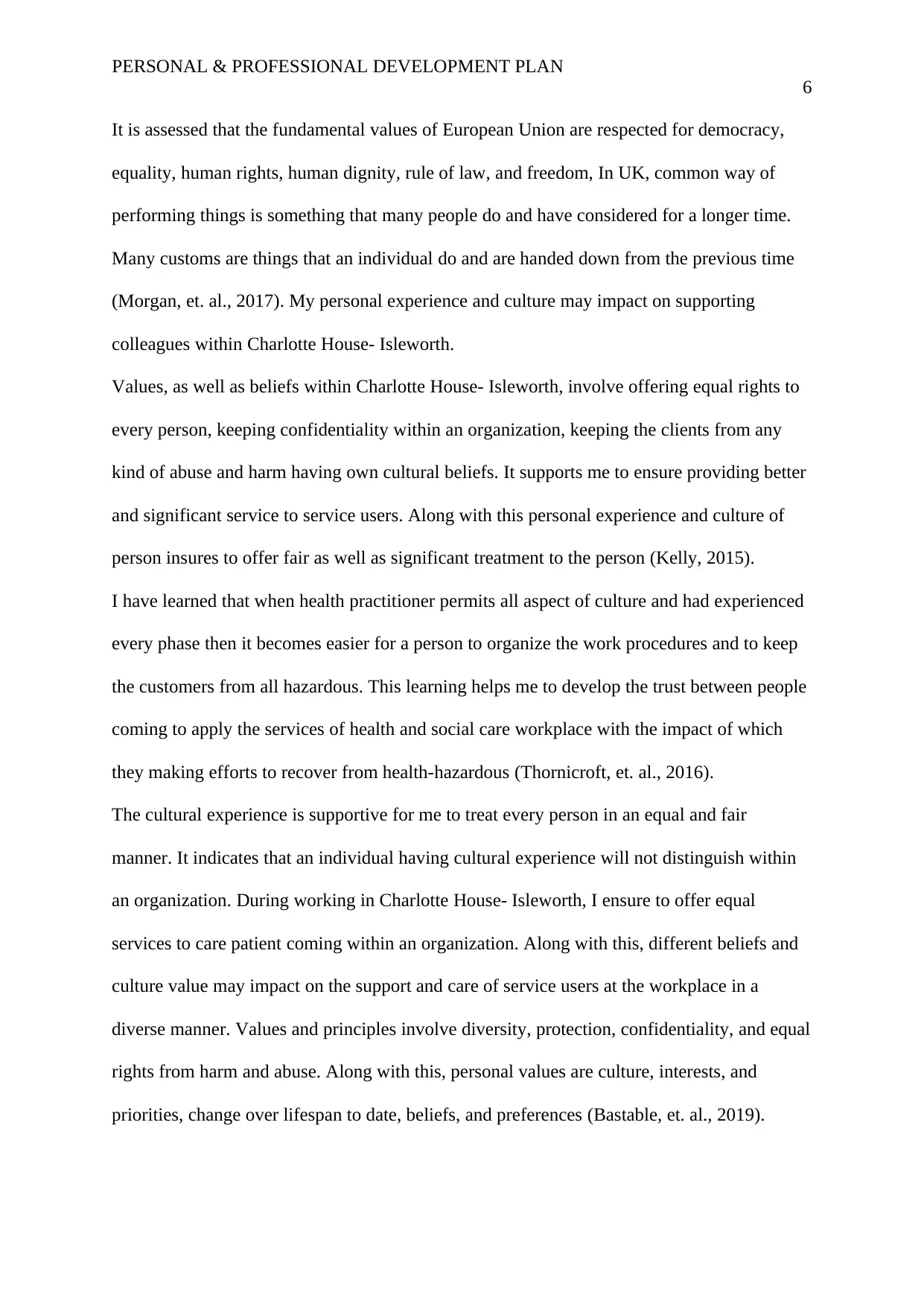
PERSONAL & PROFESSIONAL DEVELOPMENT PLAN
6
It is assessed that the fundamental values of European Union are respected for democracy,
equality, human rights, human dignity, rule of law, and freedom, In UK, common way of
performing things is something that many people do and have considered for a longer time.
Many customs are things that an individual do and are handed down from the previous time
(Morgan, et. al., 2017). My personal experience and culture may impact on supporting
colleagues within Charlotte House- Isleworth.
Values, as well as beliefs within Charlotte House- Isleworth, involve offering equal rights to
every person, keeping confidentiality within an organization, keeping the clients from any
kind of abuse and harm having own cultural beliefs. It supports me to ensure providing better
and significant service to service users. Along with this personal experience and culture of
person insures to offer fair as well as significant treatment to the person (Kelly, 2015).
I have learned that when health practitioner permits all aspect of culture and had experienced
every phase then it becomes easier for a person to organize the work procedures and to keep
the customers from all hazardous. This learning helps me to develop the trust between people
coming to apply the services of health and social care workplace with the impact of which
they making efforts to recover from health-hazardous (Thornicroft, et. al., 2016).
The cultural experience is supportive for me to treat every person in an equal and fair
manner. It indicates that an individual having cultural experience will not distinguish within
an organization. During working in Charlotte House- Isleworth, I ensure to offer equal
services to care patient coming within an organization. Along with this, different beliefs and
culture value may impact on the support and care of service users at the workplace in a
diverse manner. Values and principles involve diversity, protection, confidentiality, and equal
rights from harm and abuse. Along with this, personal values are culture, interests, and
priorities, change over lifespan to date, beliefs, and preferences (Bastable, et. al., 2019).
6
It is assessed that the fundamental values of European Union are respected for democracy,
equality, human rights, human dignity, rule of law, and freedom, In UK, common way of
performing things is something that many people do and have considered for a longer time.
Many customs are things that an individual do and are handed down from the previous time
(Morgan, et. al., 2017). My personal experience and culture may impact on supporting
colleagues within Charlotte House- Isleworth.
Values, as well as beliefs within Charlotte House- Isleworth, involve offering equal rights to
every person, keeping confidentiality within an organization, keeping the clients from any
kind of abuse and harm having own cultural beliefs. It supports me to ensure providing better
and significant service to service users. Along with this personal experience and culture of
person insures to offer fair as well as significant treatment to the person (Kelly, 2015).
I have learned that when health practitioner permits all aspect of culture and had experienced
every phase then it becomes easier for a person to organize the work procedures and to keep
the customers from all hazardous. This learning helps me to develop the trust between people
coming to apply the services of health and social care workplace with the impact of which
they making efforts to recover from health-hazardous (Thornicroft, et. al., 2016).
The cultural experience is supportive for me to treat every person in an equal and fair
manner. It indicates that an individual having cultural experience will not distinguish within
an organization. During working in Charlotte House- Isleworth, I ensure to offer equal
services to care patient coming within an organization. Along with this, different beliefs and
culture value may impact on the support and care of service users at the workplace in a
diverse manner. Values and principles involve diversity, protection, confidentiality, and equal
rights from harm and abuse. Along with this, personal values are culture, interests, and
priorities, change over lifespan to date, beliefs, and preferences (Bastable, et. al., 2019).
⊘ This is a preview!⊘
Do you want full access?
Subscribe today to unlock all pages.

Trusted by 1+ million students worldwide
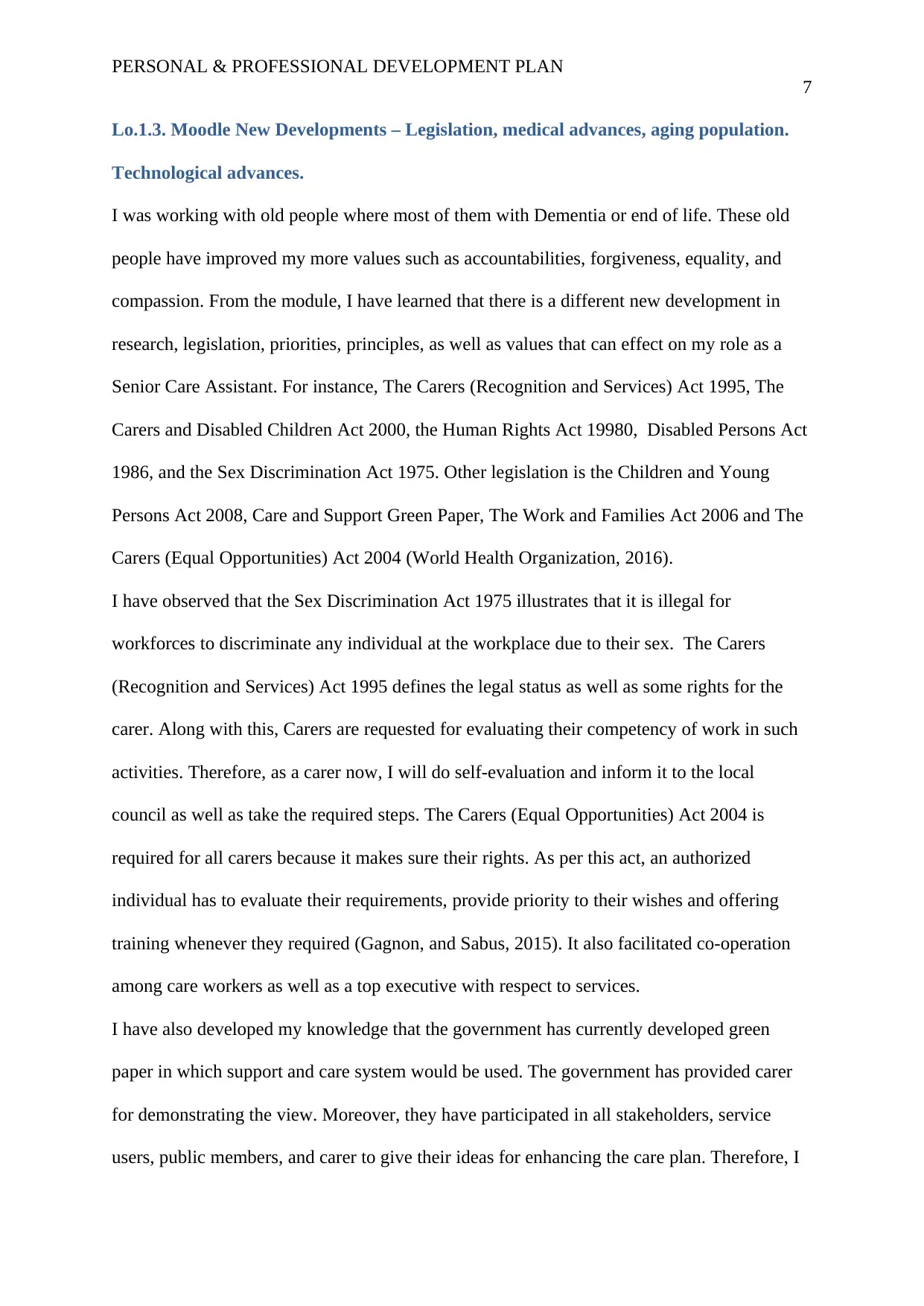
PERSONAL & PROFESSIONAL DEVELOPMENT PLAN
7
Lo.1.3. Moodle New Developments – Legislation, medical advances, aging population.
Technological advances.
I was working with old people where most of them with Dementia or end of life. These old
people have improved my more values such as accountabilities, forgiveness, equality, and
compassion. From the module, I have learned that there is a different new development in
research, legislation, priorities, principles, as well as values that can effect on my role as a
Senior Care Assistant. For instance, The Carers (Recognition and Services) Act 1995, The
Carers and Disabled Children Act 2000, the Human Rights Act 19980, Disabled Persons Act
1986, and the Sex Discrimination Act 1975. Other legislation is the Children and Young
Persons Act 2008, Care and Support Green Paper, The Work and Families Act 2006 and The
Carers (Equal Opportunities) Act 2004 (World Health Organization, 2016).
I have observed that the Sex Discrimination Act 1975 illustrates that it is illegal for
workforces to discriminate any individual at the workplace due to their sex. The Carers
(Recognition and Services) Act 1995 defines the legal status as well as some rights for the
carer. Along with this, Carers are requested for evaluating their competency of work in such
activities. Therefore, as a carer now, I will do self-evaluation and inform it to the local
council as well as take the required steps. The Carers (Equal Opportunities) Act 2004 is
required for all carers because it makes sure their rights. As per this act, an authorized
individual has to evaluate their requirements, provide priority to their wishes and offering
training whenever they required (Gagnon, and Sabus, 2015). It also facilitated co-operation
among care workers as well as a top executive with respect to services.
I have also developed my knowledge that the government has currently developed green
paper in which support and care system would be used. The government has provided carer
for demonstrating the view. Moreover, they have participated in all stakeholders, service
users, public members, and carer to give their ideas for enhancing the care plan. Therefore, I
7
Lo.1.3. Moodle New Developments – Legislation, medical advances, aging population.
Technological advances.
I was working with old people where most of them with Dementia or end of life. These old
people have improved my more values such as accountabilities, forgiveness, equality, and
compassion. From the module, I have learned that there is a different new development in
research, legislation, priorities, principles, as well as values that can effect on my role as a
Senior Care Assistant. For instance, The Carers (Recognition and Services) Act 1995, The
Carers and Disabled Children Act 2000, the Human Rights Act 19980, Disabled Persons Act
1986, and the Sex Discrimination Act 1975. Other legislation is the Children and Young
Persons Act 2008, Care and Support Green Paper, The Work and Families Act 2006 and The
Carers (Equal Opportunities) Act 2004 (World Health Organization, 2016).
I have observed that the Sex Discrimination Act 1975 illustrates that it is illegal for
workforces to discriminate any individual at the workplace due to their sex. The Carers
(Recognition and Services) Act 1995 defines the legal status as well as some rights for the
carer. Along with this, Carers are requested for evaluating their competency of work in such
activities. Therefore, as a carer now, I will do self-evaluation and inform it to the local
council as well as take the required steps. The Carers (Equal Opportunities) Act 2004 is
required for all carers because it makes sure their rights. As per this act, an authorized
individual has to evaluate their requirements, provide priority to their wishes and offering
training whenever they required (Gagnon, and Sabus, 2015). It also facilitated co-operation
among care workers as well as a top executive with respect to services.
I have also developed my knowledge that the government has currently developed green
paper in which support and care system would be used. The government has provided carer
for demonstrating the view. Moreover, they have participated in all stakeholders, service
users, public members, and carer to give their ideas for enhancing the care plan. Therefore, I
Paraphrase This Document
Need a fresh take? Get an instant paraphrase of this document with our AI Paraphraser
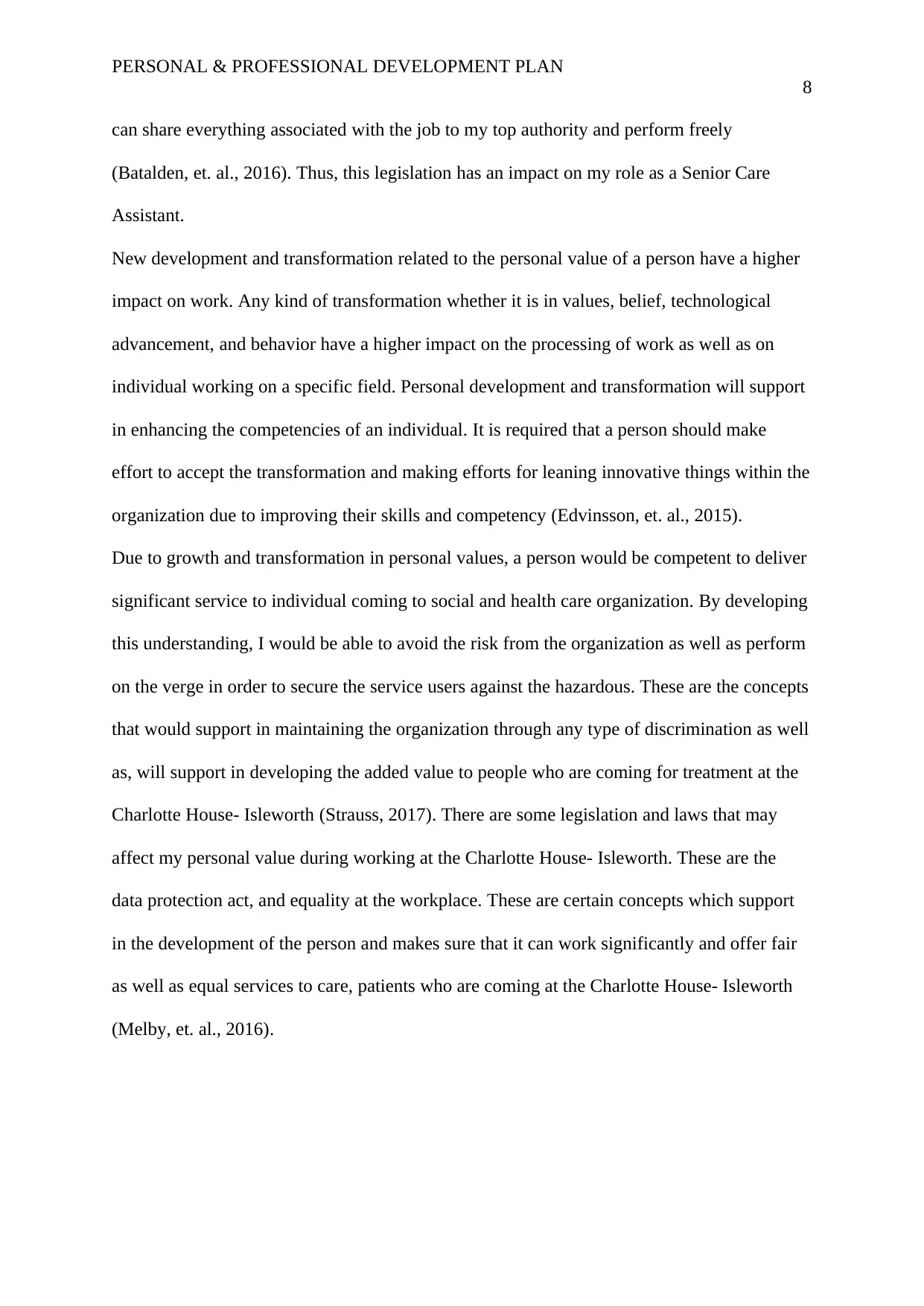
PERSONAL & PROFESSIONAL DEVELOPMENT PLAN
8
can share everything associated with the job to my top authority and perform freely
(Batalden, et. al., 2016). Thus, this legislation has an impact on my role as a Senior Care
Assistant.
New development and transformation related to the personal value of a person have a higher
impact on work. Any kind of transformation whether it is in values, belief, technological
advancement, and behavior have a higher impact on the processing of work as well as on
individual working on a specific field. Personal development and transformation will support
in enhancing the competencies of an individual. It is required that a person should make
effort to accept the transformation and making efforts for leaning innovative things within the
organization due to improving their skills and competency (Edvinsson, et. al., 2015).
Due to growth and transformation in personal values, a person would be competent to deliver
significant service to individual coming to social and health care organization. By developing
this understanding, I would be able to avoid the risk from the organization as well as perform
on the verge in order to secure the service users against the hazardous. These are the concepts
that would support in maintaining the organization through any type of discrimination as well
as, will support in developing the added value to people who are coming for treatment at the
Charlotte House- Isleworth (Strauss, 2017). There are some legislation and laws that may
affect my personal value during working at the Charlotte House- Isleworth. These are the
data protection act, and equality at the workplace. These are certain concepts which support
in the development of the person and makes sure that it can work significantly and offer fair
as well as equal services to care, patients who are coming at the Charlotte House- Isleworth
(Melby, et. al., 2016).
8
can share everything associated with the job to my top authority and perform freely
(Batalden, et. al., 2016). Thus, this legislation has an impact on my role as a Senior Care
Assistant.
New development and transformation related to the personal value of a person have a higher
impact on work. Any kind of transformation whether it is in values, belief, technological
advancement, and behavior have a higher impact on the processing of work as well as on
individual working on a specific field. Personal development and transformation will support
in enhancing the competencies of an individual. It is required that a person should make
effort to accept the transformation and making efforts for leaning innovative things within the
organization due to improving their skills and competency (Edvinsson, et. al., 2015).
Due to growth and transformation in personal values, a person would be competent to deliver
significant service to individual coming to social and health care organization. By developing
this understanding, I would be able to avoid the risk from the organization as well as perform
on the verge in order to secure the service users against the hazardous. These are the concepts
that would support in maintaining the organization through any type of discrimination as well
as, will support in developing the added value to people who are coming for treatment at the
Charlotte House- Isleworth (Strauss, 2017). There are some legislation and laws that may
affect my personal value during working at the Charlotte House- Isleworth. These are the
data protection act, and equality at the workplace. These are certain concepts which support
in the development of the person and makes sure that it can work significantly and offer fair
as well as equal services to care, patients who are coming at the Charlotte House- Isleworth
(Melby, et. al., 2016).
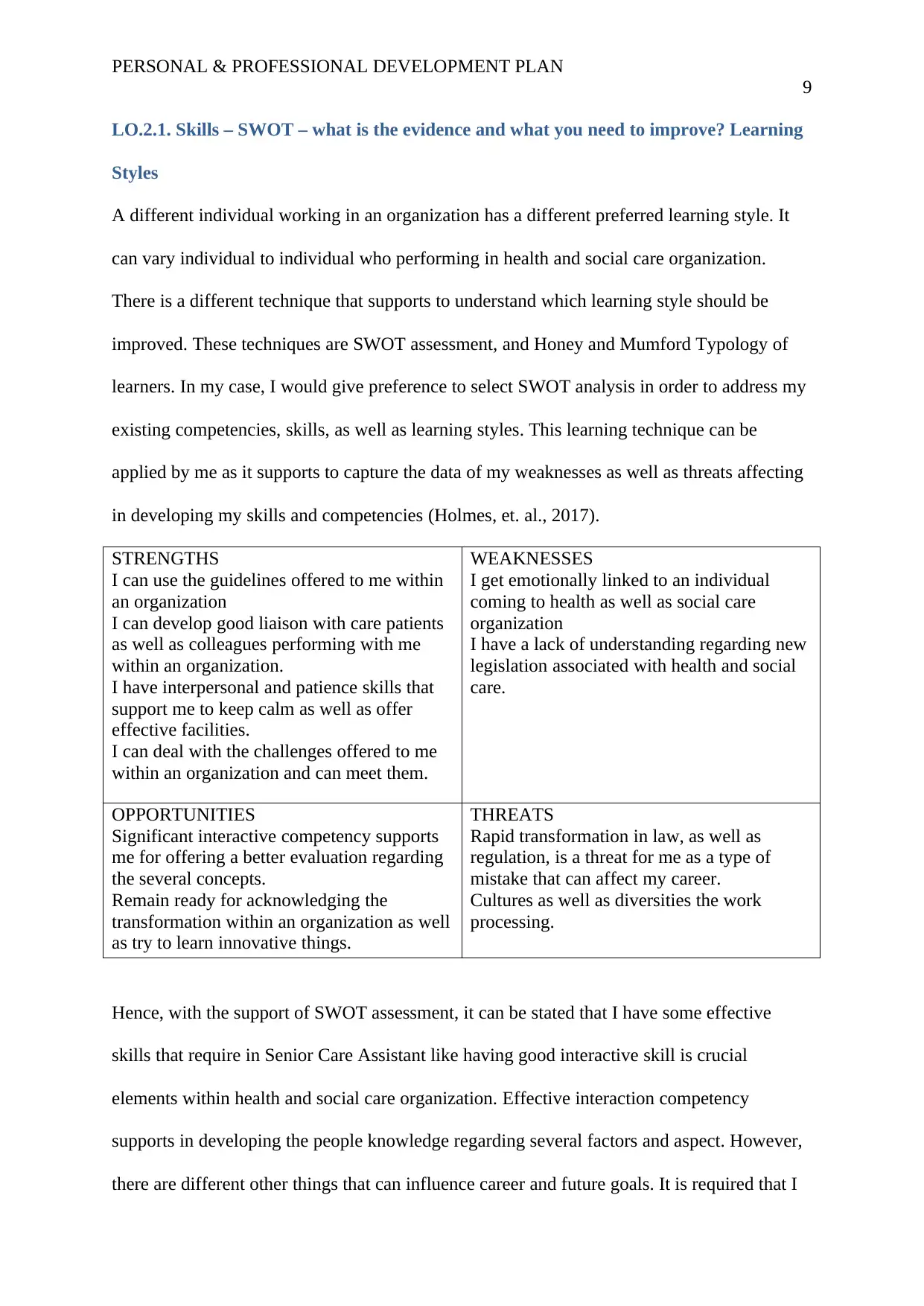
PERSONAL & PROFESSIONAL DEVELOPMENT PLAN
9
LO.2.1. Skills – SWOT – what is the evidence and what you need to improve? Learning
Styles
A different individual working in an organization has a different preferred learning style. It
can vary individual to individual who performing in health and social care organization.
There is a different technique that supports to understand which learning style should be
improved. These techniques are SWOT assessment, and Honey and Mumford Typology of
learners. In my case, I would give preference to select SWOT analysis in order to address my
existing competencies, skills, as well as learning styles. This learning technique can be
applied by me as it supports to capture the data of my weaknesses as well as threats affecting
in developing my skills and competencies (Holmes, et. al., 2017).
STRENGTHS
I can use the guidelines offered to me within
an organization
I can develop good liaison with care patients
as well as colleagues performing with me
within an organization.
I have interpersonal and patience skills that
support me to keep calm as well as offer
effective facilities.
I can deal with the challenges offered to me
within an organization and can meet them.
WEAKNESSES
I get emotionally linked to an individual
coming to health as well as social care
organization
I have a lack of understanding regarding new
legislation associated with health and social
care.
OPPORTUNITIES
Significant interactive competency supports
me for offering a better evaluation regarding
the several concepts.
Remain ready for acknowledging the
transformation within an organization as well
as try to learn innovative things.
THREATS
Rapid transformation in law, as well as
regulation, is a threat for me as a type of
mistake that can affect my career.
Cultures as well as diversities the work
processing.
Hence, with the support of SWOT assessment, it can be stated that I have some effective
skills that require in Senior Care Assistant like having good interactive skill is crucial
elements within health and social care organization. Effective interaction competency
supports in developing the people knowledge regarding several factors and aspect. However,
there are different other things that can influence career and future goals. It is required that I
9
LO.2.1. Skills – SWOT – what is the evidence and what you need to improve? Learning
Styles
A different individual working in an organization has a different preferred learning style. It
can vary individual to individual who performing in health and social care organization.
There is a different technique that supports to understand which learning style should be
improved. These techniques are SWOT assessment, and Honey and Mumford Typology of
learners. In my case, I would give preference to select SWOT analysis in order to address my
existing competencies, skills, as well as learning styles. This learning technique can be
applied by me as it supports to capture the data of my weaknesses as well as threats affecting
in developing my skills and competencies (Holmes, et. al., 2017).
STRENGTHS
I can use the guidelines offered to me within
an organization
I can develop good liaison with care patients
as well as colleagues performing with me
within an organization.
I have interpersonal and patience skills that
support me to keep calm as well as offer
effective facilities.
I can deal with the challenges offered to me
within an organization and can meet them.
WEAKNESSES
I get emotionally linked to an individual
coming to health as well as social care
organization
I have a lack of understanding regarding new
legislation associated with health and social
care.
OPPORTUNITIES
Significant interactive competency supports
me for offering a better evaluation regarding
the several concepts.
Remain ready for acknowledging the
transformation within an organization as well
as try to learn innovative things.
THREATS
Rapid transformation in law, as well as
regulation, is a threat for me as a type of
mistake that can affect my career.
Cultures as well as diversities the work
processing.
Hence, with the support of SWOT assessment, it can be stated that I have some effective
skills that require in Senior Care Assistant like having good interactive skill is crucial
elements within health and social care organization. Effective interaction competency
supports in developing the people knowledge regarding several factors and aspect. However,
there are different other things that can influence career and future goals. It is required that I
⊘ This is a preview!⊘
Do you want full access?
Subscribe today to unlock all pages.

Trusted by 1+ million students worldwide
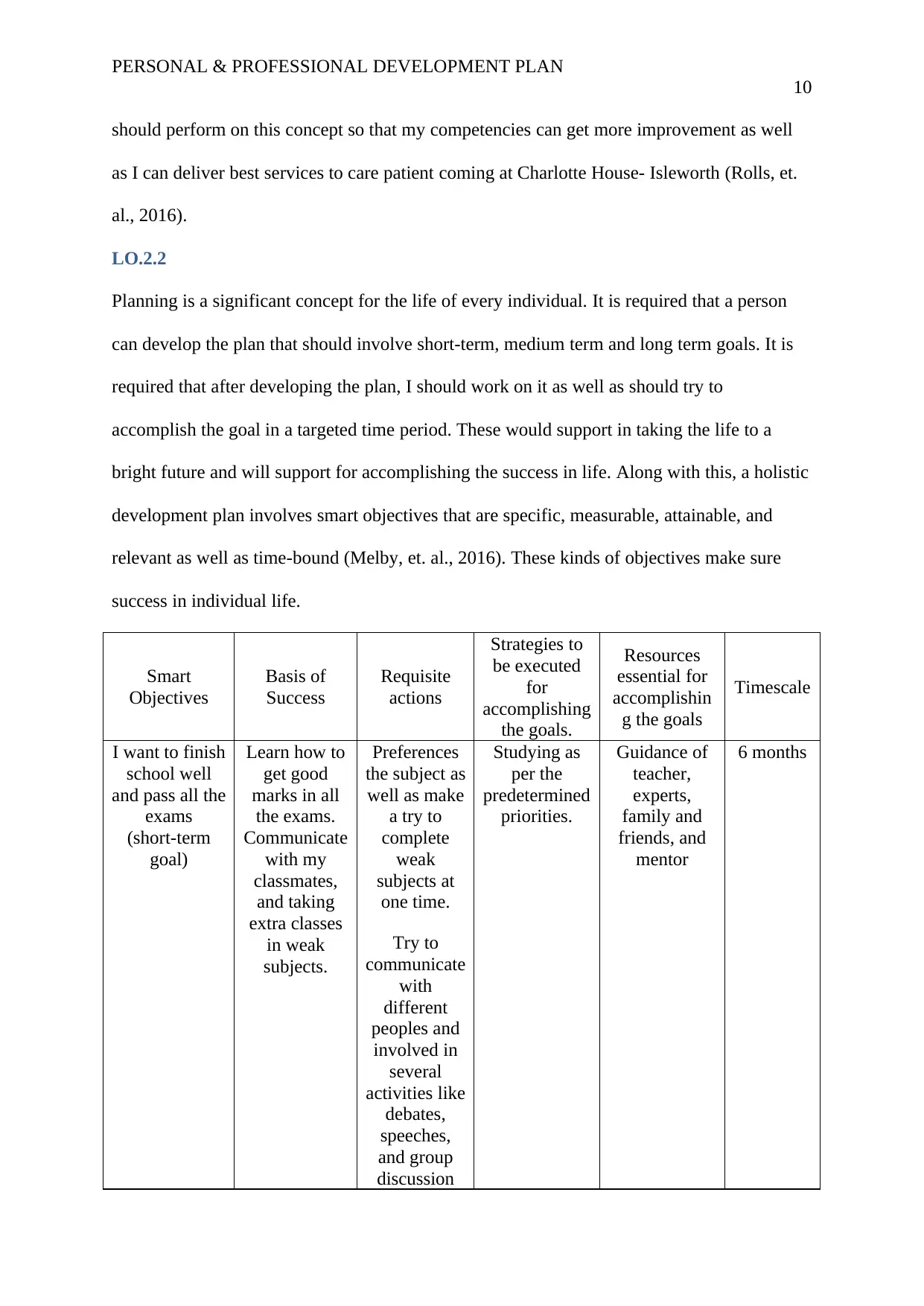
PERSONAL & PROFESSIONAL DEVELOPMENT PLAN
10
should perform on this concept so that my competencies can get more improvement as well
as I can deliver best services to care patient coming at Charlotte House- Isleworth (Rolls, et.
al., 2016).
LO.2.2
Planning is a significant concept for the life of every individual. It is required that a person
can develop the plan that should involve short-term, medium term and long term goals. It is
required that after developing the plan, I should work on it as well as should try to
accomplish the goal in a targeted time period. These would support in taking the life to a
bright future and will support for accomplishing the success in life. Along with this, a holistic
development plan involves smart objectives that are specific, measurable, attainable, and
relevant as well as time-bound (Melby, et. al., 2016). These kinds of objectives make sure
success in individual life.
Smart
Objectives
Basis of
Success
Requisite
actions
Strategies to
be executed
for
accomplishing
the goals.
Resources
essential for
accomplishin
g the goals
Timescale
I want to finish
school well
and pass all the
exams
(short-term
goal)
Learn how to
get good
marks in all
the exams.
Communicate
with my
classmates,
and taking
extra classes
in weak
subjects.
Preferences
the subject as
well as make
a try to
complete
weak
subjects at
one time.
Try to
communicate
with
different
peoples and
involved in
several
activities like
debates,
speeches,
and group
discussion
Studying as
per the
predetermined
priorities.
Guidance of
teacher,
experts,
family and
friends, and
mentor
6 months
10
should perform on this concept so that my competencies can get more improvement as well
as I can deliver best services to care patient coming at Charlotte House- Isleworth (Rolls, et.
al., 2016).
LO.2.2
Planning is a significant concept for the life of every individual. It is required that a person
can develop the plan that should involve short-term, medium term and long term goals. It is
required that after developing the plan, I should work on it as well as should try to
accomplish the goal in a targeted time period. These would support in taking the life to a
bright future and will support for accomplishing the success in life. Along with this, a holistic
development plan involves smart objectives that are specific, measurable, attainable, and
relevant as well as time-bound (Melby, et. al., 2016). These kinds of objectives make sure
success in individual life.
Smart
Objectives
Basis of
Success
Requisite
actions
Strategies to
be executed
for
accomplishing
the goals.
Resources
essential for
accomplishin
g the goals
Timescale
I want to finish
school well
and pass all the
exams
(short-term
goal)
Learn how to
get good
marks in all
the exams.
Communicate
with my
classmates,
and taking
extra classes
in weak
subjects.
Preferences
the subject as
well as make
a try to
complete
weak
subjects at
one time.
Try to
communicate
with
different
peoples and
involved in
several
activities like
debates,
speeches,
and group
discussion
Studying as
per the
predetermined
priorities.
Guidance of
teacher,
experts,
family and
friends, and
mentor
6 months
Paraphrase This Document
Need a fresh take? Get an instant paraphrase of this document with our AI Paraphraser
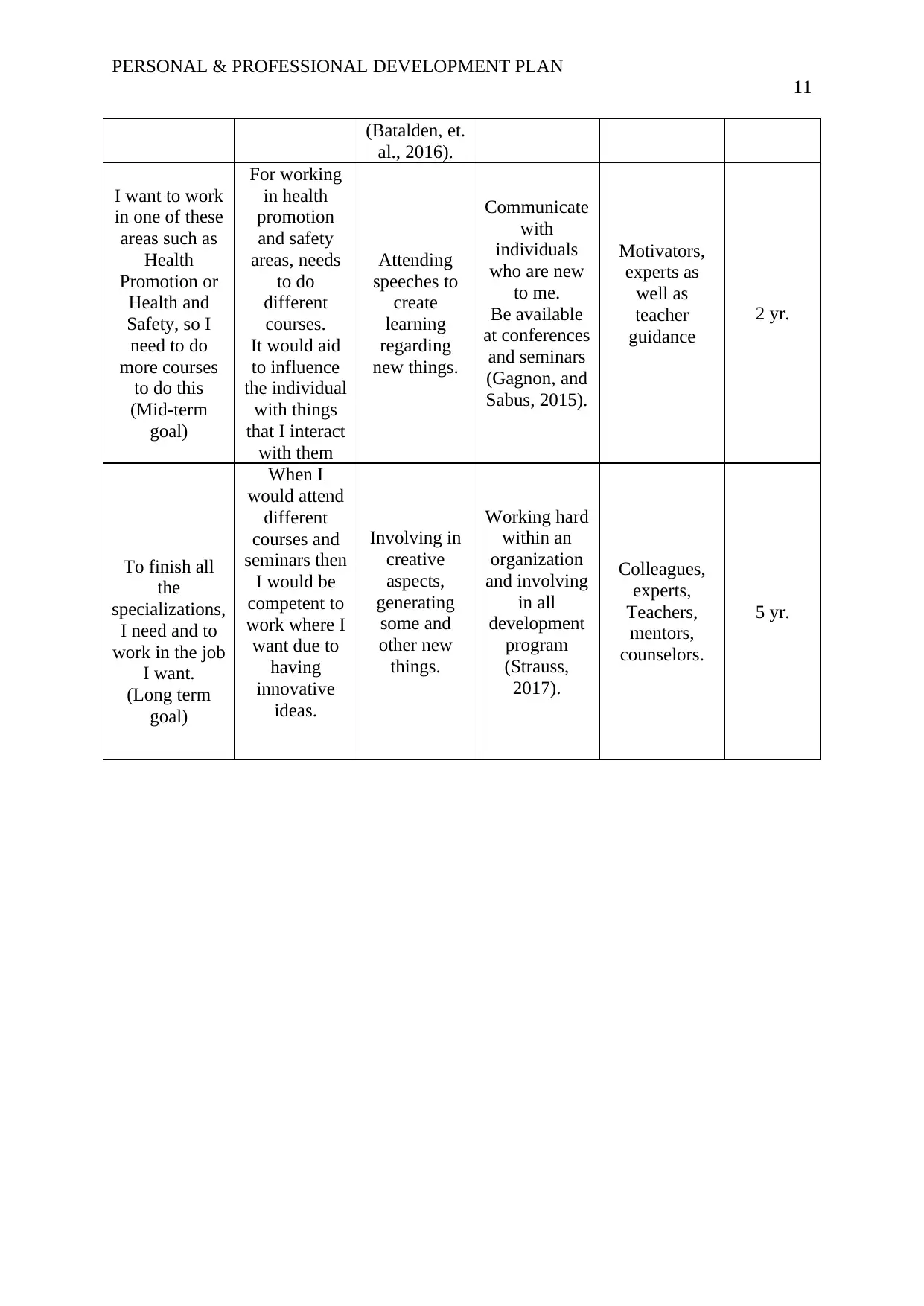
PERSONAL & PROFESSIONAL DEVELOPMENT PLAN
11
(Batalden, et.
al., 2016).
I want to work
in one of these
areas such as
Health
Promotion or
Health and
Safety, so I
need to do
more courses
to do this
(Mid-term
goal)
For working
in health
promotion
and safety
areas, needs
to do
different
courses.
It would aid
to influence
the individual
with things
that I interact
with them
Attending
speeches to
create
learning
regarding
new things.
Communicate
with
individuals
who are new
to me.
Be available
at conferences
and seminars
(Gagnon, and
Sabus, 2015).
Motivators,
experts as
well as
teacher
guidance
2 yr.
To finish all
the
specializations,
I need and to
work in the job
I want.
(Long term
goal)
When I
would attend
different
courses and
seminars then
I would be
competent to
work where I
want due to
having
innovative
ideas.
Involving in
creative
aspects,
generating
some and
other new
things.
Working hard
within an
organization
and involving
in all
development
program
(Strauss,
2017).
Colleagues,
experts,
Teachers,
mentors,
counselors.
5 yr.
11
(Batalden, et.
al., 2016).
I want to work
in one of these
areas such as
Health
Promotion or
Health and
Safety, so I
need to do
more courses
to do this
(Mid-term
goal)
For working
in health
promotion
and safety
areas, needs
to do
different
courses.
It would aid
to influence
the individual
with things
that I interact
with them
Attending
speeches to
create
learning
regarding
new things.
Communicate
with
individuals
who are new
to me.
Be available
at conferences
and seminars
(Gagnon, and
Sabus, 2015).
Motivators,
experts as
well as
teacher
guidance
2 yr.
To finish all
the
specializations,
I need and to
work in the job
I want.
(Long term
goal)
When I
would attend
different
courses and
seminars then
I would be
competent to
work where I
want due to
having
innovative
ideas.
Involving in
creative
aspects,
generating
some and
other new
things.
Working hard
within an
organization
and involving
in all
development
program
(Strauss,
2017).
Colleagues,
experts,
Teachers,
mentors,
counselors.
5 yr.
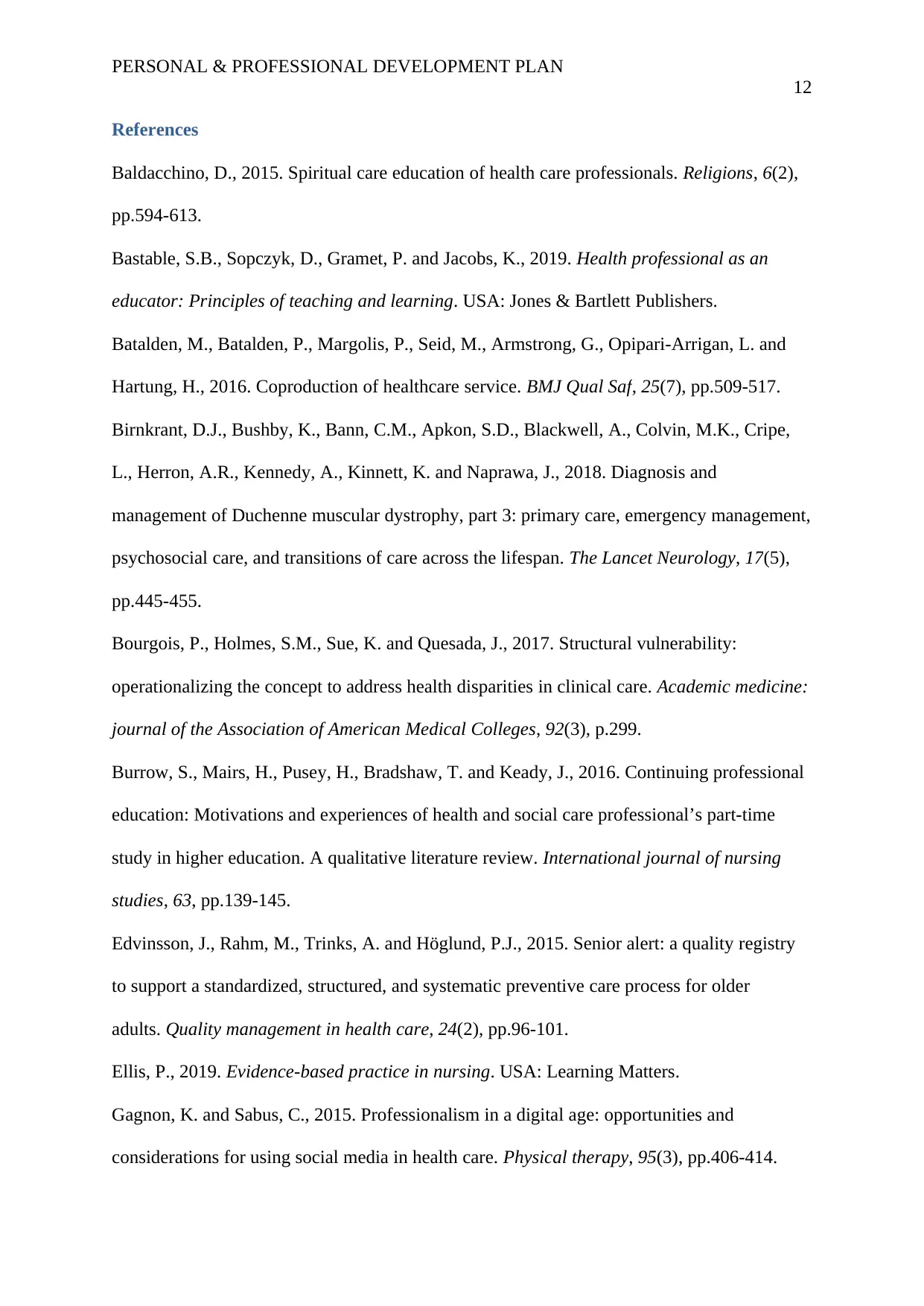
PERSONAL & PROFESSIONAL DEVELOPMENT PLAN
12
References
Baldacchino, D., 2015. Spiritual care education of health care professionals. Religions, 6(2),
pp.594-613.
Bastable, S.B., Sopczyk, D., Gramet, P. and Jacobs, K., 2019. Health professional as an
educator: Principles of teaching and learning. USA: Jones & Bartlett Publishers.
Batalden, M., Batalden, P., Margolis, P., Seid, M., Armstrong, G., Opipari-Arrigan, L. and
Hartung, H., 2016. Coproduction of healthcare service. BMJ Qual Saf, 25(7), pp.509-517.
Birnkrant, D.J., Bushby, K., Bann, C.M., Apkon, S.D., Blackwell, A., Colvin, M.K., Cripe,
L., Herron, A.R., Kennedy, A., Kinnett, K. and Naprawa, J., 2018. Diagnosis and
management of Duchenne muscular dystrophy, part 3: primary care, emergency management,
psychosocial care, and transitions of care across the lifespan. The Lancet Neurology, 17(5),
pp.445-455.
Bourgois, P., Holmes, S.M., Sue, K. and Quesada, J., 2017. Structural vulnerability:
operationalizing the concept to address health disparities in clinical care. Academic medicine:
journal of the Association of American Medical Colleges, 92(3), p.299.
Burrow, S., Mairs, H., Pusey, H., Bradshaw, T. and Keady, J., 2016. Continuing professional
education: Motivations and experiences of health and social care professional’s part-time
study in higher education. A qualitative literature review. International journal of nursing
studies, 63, pp.139-145.
Edvinsson, J., Rahm, M., Trinks, A. and Höglund, P.J., 2015. Senior alert: a quality registry
to support a standardized, structured, and systematic preventive care process for older
adults. Quality management in health care, 24(2), pp.96-101.
Ellis, P., 2019. Evidence-based practice in nursing. USA: Learning Matters.
Gagnon, K. and Sabus, C., 2015. Professionalism in a digital age: opportunities and
considerations for using social media in health care. Physical therapy, 95(3), pp.406-414.
12
References
Baldacchino, D., 2015. Spiritual care education of health care professionals. Religions, 6(2),
pp.594-613.
Bastable, S.B., Sopczyk, D., Gramet, P. and Jacobs, K., 2019. Health professional as an
educator: Principles of teaching and learning. USA: Jones & Bartlett Publishers.
Batalden, M., Batalden, P., Margolis, P., Seid, M., Armstrong, G., Opipari-Arrigan, L. and
Hartung, H., 2016. Coproduction of healthcare service. BMJ Qual Saf, 25(7), pp.509-517.
Birnkrant, D.J., Bushby, K., Bann, C.M., Apkon, S.D., Blackwell, A., Colvin, M.K., Cripe,
L., Herron, A.R., Kennedy, A., Kinnett, K. and Naprawa, J., 2018. Diagnosis and
management of Duchenne muscular dystrophy, part 3: primary care, emergency management,
psychosocial care, and transitions of care across the lifespan. The Lancet Neurology, 17(5),
pp.445-455.
Bourgois, P., Holmes, S.M., Sue, K. and Quesada, J., 2017. Structural vulnerability:
operationalizing the concept to address health disparities in clinical care. Academic medicine:
journal of the Association of American Medical Colleges, 92(3), p.299.
Burrow, S., Mairs, H., Pusey, H., Bradshaw, T. and Keady, J., 2016. Continuing professional
education: Motivations and experiences of health and social care professional’s part-time
study in higher education. A qualitative literature review. International journal of nursing
studies, 63, pp.139-145.
Edvinsson, J., Rahm, M., Trinks, A. and Höglund, P.J., 2015. Senior alert: a quality registry
to support a standardized, structured, and systematic preventive care process for older
adults. Quality management in health care, 24(2), pp.96-101.
Ellis, P., 2019. Evidence-based practice in nursing. USA: Learning Matters.
Gagnon, K. and Sabus, C., 2015. Professionalism in a digital age: opportunities and
considerations for using social media in health care. Physical therapy, 95(3), pp.406-414.
⊘ This is a preview!⊘
Do you want full access?
Subscribe today to unlock all pages.

Trusted by 1+ million students worldwide
1 out of 14
Related Documents
Your All-in-One AI-Powered Toolkit for Academic Success.
+13062052269
info@desklib.com
Available 24*7 on WhatsApp / Email
![[object Object]](/_next/static/media/star-bottom.7253800d.svg)
Unlock your academic potential
Copyright © 2020–2026 A2Z Services. All Rights Reserved. Developed and managed by ZUCOL.




